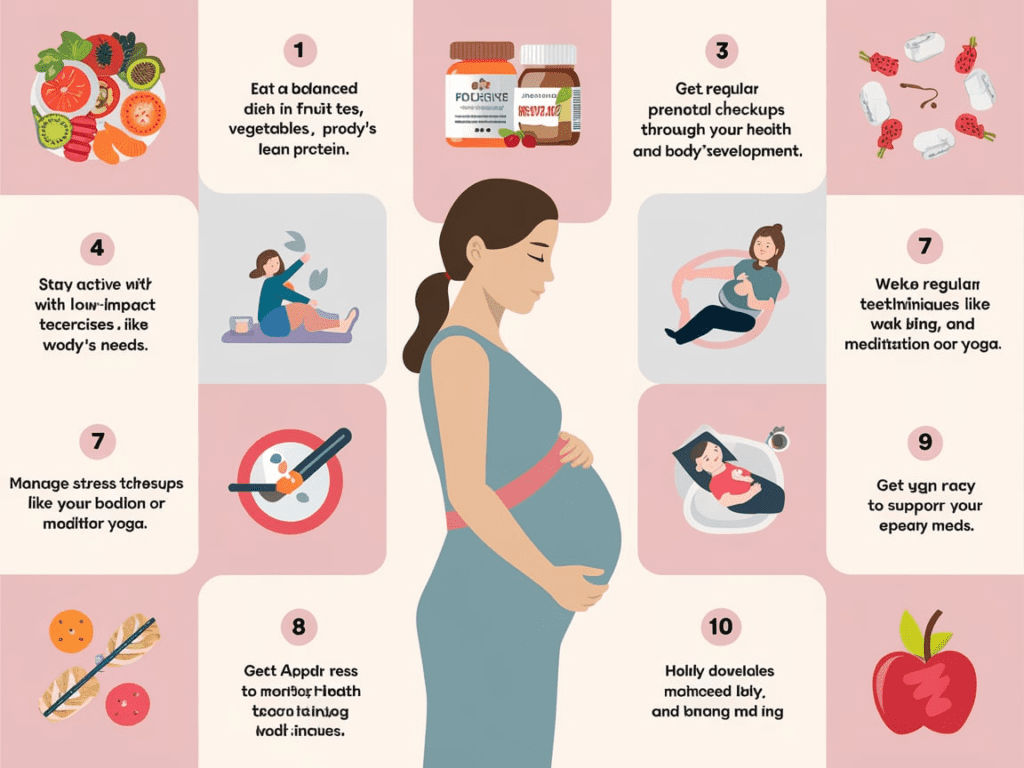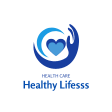Meta Description: Learn essential tips for a healthy pregnancy, from early stages to delivery. Discover advice on nutrition, exercise, prenatal care, and frequently asked questions to ensure a safe and smooth journey to motherhood.
Pregnancy is a transformative experience that comes with excitement, anticipation, and, at times, challenges. For expectant mothers, staying healthy throughout the pregnancy journey is crucial for both the mother’s well-being and the baby’s development. This guide covers the essential tips for maintaining a healthy pregnancy, the stages of pregnancy, common symptoms, and frequently asked questions to help you navigate the experience with confidence.
Stages of Pregnancy: What to Expect

Pregnancy is generally divided into three trimesters, each marked by different milestones and developments. Here’s what to expect in each phase:
First Trimester (Weeks 1-12)
The first trimester is a vital stage for fetal development. During this time, your baby’s organs, bones, and tissues begin to form. You may experience symptoms such as morning sickness, fatigue, and changes in mood.
- Health Tips:
- Start taking prenatal vitamins that include folic acid, which is essential for preventing neural tube defects.
- Eat small, frequent meals to reduce nausea.
- Stay hydrated and avoid caffeine.
Second Trimester (Weeks 13-26)
Often referred to as the “honeymoon phase,” the second trimester typically brings relief from early pregnancy symptoms. Your baby begins to grow rapidly during this stage, and you may start feeling your baby move.
- Health Tips:
- Focus on a balanced diet rich in protein, calcium, and iron.
- Engage in light exercise, like walking or prenatal yoga, to improve circulation and reduce stress.
- Schedule your anatomy scan (typically between 18-22 weeks) to check the baby’s development.
Third Trimester (Weeks 27-40)
During the third trimester, your baby continues to grow and develop, and you may experience more physical discomfort due to the added weight. The anticipation of labor and delivery increases as you near your due date.
- Health Tips:
- Continue practicing relaxation techniques, like deep breathing or prenatal massage, to ease stress and discomfort.
- Avoid standing or sitting for long periods, and make sure to rest frequently.
- Monitor your baby’s movements and report any concerns to your doctor.
Essential Tips for a Healthy Pregnancy

A healthy pregnancy relies on proper nutrition, physical activity, prenatal care, and emotional well-being. Here are some key tips to ensure you are on the right track:
- Nutrition: Eat for Two, but Wisely While it’s commonly said that you’re eating for two during pregnancy, it’s important to focus on nutrient-dense foods rather than increasing your calorie intake drastically. Include a variety of foods to ensure you and your baby are getting the necessary vitamins and minerals.
- Key Nutrients: Folic acid (to support the baby’s brain and spinal cord), calcium (for the baby’s bones), iron (to prevent anemia), and omega-3 fatty acids (for brain development).
- Exercise: Stay Active (but Safe) Staying active during pregnancy can reduce stress, improve sleep, and prepare your body for labor. Low-impact exercises like walking, swimming, and prenatal yoga are safe and beneficial. Always consult your healthcare provider before starting any new exercise routine to ensure it’s appropriate for your specific needs.
- Prenatal Care: Regular Checkups Are Key Prenatal visits are essential to monitor both your health and your baby’s progress. These visits will help detect any potential complications, ensure proper fetal growth, and provide the opportunity to address any concerns you may have. It’s also important to keep up with recommended screenings and vaccinations during pregnancy.
- Rest and Relaxation: Listen to Your Body Pregnancy can be physically and mentally exhausting, so rest is crucial. Be sure to get plenty of sleep, practice stress management techniques, and take breaks when needed. Your well-being is just as important as your baby’s, so make self-care a priority.
- Hydration: Keep Drinking Water Staying hydrated is vital for maintaining healthy amniotic fluid levels, preventing swelling, and supporting the body’s increased blood volume during pregnancy. Aim to drink at least eight glasses of water daily.
Common Pregnancy Symptoms and How to Manage Them
Pregnancy brings about many physical and emotional changes. Some symptoms are common and can be managed with a little self-care. Here are a few:
- Morning Sickness: A typical symptom in the first trimester, morning sickness can be managed by eating small meals throughout the day, staying hydrated, and avoiding triggers like strong smells.
- Back Pain: As your body changes, back pain may become an issue. Maintaining good posture, using a pregnancy pillow, and doing light stretching can help alleviate discomfort.
- Swelling: Swelling of the feet and ankles is common in the later stages of pregnancy. Elevate your feet when resting and avoid standing for long periods.
Labor and Delivery: What to Expect
Labor is the culmination of your pregnancy journey. While every birth experience is different, here’s what you can generally expect:
- Signs of Labor: Contractions, breaking of water, and lower back pain are common signs that labor is beginning. If you notice any of these signs, contact your healthcare provider.
- Delivery Options: You can opt for a vaginal birth or a cesarean section (C-section), depending on the circumstances. Make sure to discuss your preferences and birth plan with your healthcare provider.
- Postpartum Care: After delivery, you will need to take time to recover. Your healthcare team will provide guidance on postpartum care, including managing any discomfort, emotional changes, and breastfeeding support.
FAQs About Healthy Pregnancy
1. What foods should I avoid during pregnancy?
- Avoid raw fish, unpasteurized dairy products, deli meats, and foods high in mercury (such as swordfish). These can pose risks to both you and your baby.
2. Can I exercise during pregnancy?
- Yes, exercising during pregnancy is generally safe. However, always consult your healthcare provider first. Low-impact activities like walking, swimming, and yoga are great choices.
3. How much weight should I gain during pregnancy?
- Weight gain varies depending on your starting weight and health. On average, women should gain between 25 to 35 pounds, but your doctor will provide tailored advice based on your specific situation.
4. Is it safe to travel during pregnancy?
- Traveling is usually safe, especially during the second trimester. However, it’s important to avoid long flights or risky activities and always consult your doctor before traveling.
5. What are the signs of complications during pregnancy?
- Seek medical attention if you experience severe abdominal pain, unusual bleeding, a significant decrease in fetal movement, or sudden swelling in your hands or face.
Resources for a Healthy Pregnancy
For additional information and support, here are some trusted resources:
- American Pregnancy Association
https://americanpregnancy.org - Mayo Clinic – Pregnancy and Baby
https://www.mayoclinic.org/healthy-lifestyle/pregnancy-week-by-week - The Bump – Pregnancy Guide
https://www.thebump.com - WebMD – Pregnancy Health Center
https://www.webmd.com/baby/default.htm - Centers for Disease Control and Prevention (CDC) – Pregnancy
https://www.cdc.gov/pregnancy - Healthline – Pregnancy
https://www.healthline.com/health/pregnancy
Conclusion
A healthy pregnancy requires attention to both your physical and emotional well-being. By maintaining a balanced diet, exercising safely, attending prenatal checkups, and practicing self-care, you can ensure a healthy pregnancy for both you and your baby. Always consult your healthcare provider if you have any concerns or questions during this important time in your life.



